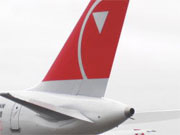Minneapolis, Minn. — (AP) Northwest Airlines Corp. resumed hiring permanent replacements for striking mechanics on Friday, after their union refused to put the company's latest offer to a vote.
Few thought union workers would approve the deal, which would have only brought back about 500 of more than 4,000 union members who went on strike.
But it would have been the first up-or-down vote on a company offer. The union leadership has been criticized for not allowing votes on earlier offers, including one just before the strike that would have brought back 2,750 workers.
The Aircraft Mechanics Fraternal Association seemed to be holding its nose when it agreed to the vote on Oct. 14. It told members, "When you look at the details you will be hard pressed to find anything 'good."'
It said about 541 to 580 replacement workers would keep their jobs, and they wouldn't have to join the union or pay dues. Even workers who got their jobs back would have been working for smaller paychecks under a company-imposed contract.
"The fact that it wasn't endorsed (by union leaders) indicates that AMFA was just going through the motions" to dispel criticism that hadn't allowed a vote, said Gary Chaison, an industrial relations expert at Clark University in Worcester, Mass.
But the union called off the vote late Thursday, saying Northwest inserted language in its written offer that had not been discussed before.
Both the company and the union said the language was aimed at preventing retaliation against replacement workers who would be working side-by-side with returning strikers. But the union said the effect of the language was to take away the union's right to govern its members.
"This is not about protecting scabs from harassment - existing work rules already do that," chief union negotiator Jim Young said in his statement announcing that no vote would take place.
Union negotiations spokesman Jeff Mathews said Young received the proposal on Wednesday. "As soon as he got it he knew it was going to be a problem," Mathews said.
A letter from Northwest Vice President for Labor Relations Julie Hagen Showers to Young on Thursday said AMFA was apparently considering fines for members who have already crossed the picket line in the two-month-old strike.
If that happened, she said, Northwest might then reduce the four weeks of severance pay offered to union members who lost their jobs, using the money instead for a fund to pay the fines levied by the union.
The strike appears to be taking a toll on AMFA, which also represents mechanics at United Airlines, Southwest Airlines Co., and Alaska Airlines. On Tuesday, a union memo said it would begin consolidating its locals "due to the current state of the aviation industry, and other factors such as the loss of dues income of approximately 1/3 of our membership." And the union has acknowledged that about 70 members have crossed the Northwest picket line.
University of Minnesota labor professor John Remington said it's understandable that Northwest was worried about retaliation by union members against replacement workers. But Northwest's attempt to limit that could be perceived "as an attempt to break the union, and at best is simply an unwarranted interference in the internal affairs of the organization. It's like a poison pill."
So is this strike all but over? It depends on just how badly the airline needs those union mechanics, Remington said.
"If they can permanently replace 100 percent of them, then it's over," he said. But he noted that Northwest was still talking to the union as recently as last week.
"I suspect that they wouldn't be continuing to try to negotiate with the mechanics if they didn't want them back," he said.
Chaison, of Clark University, said the union bet that Northwest couldn't replace them, that safety-conscious consumers wouldn't fly the airline, and that other unions would refuse to cross their picket line. None of those things happened.
"AMFA right now is back to square one, which is really not very good," he said. "The worst thing you can do is go on strike and not be noticed, and I think that's what's happened here."
Also Friday, a firm called East Texas Capital Partners LLC said it is asking the trustee in Northwest's bankruptcy to form a committee for shareholders.
In most bankruptcies, the common shares are canceled when the company emerges from bankruptcy. But East Texas Capital questioned whether Northwest really needed to file for bankruptcy and said there should be some value left for shareholders.
East Texas Capital said it "believes that NWA's bankruptcy is, at best, technical and opportunistic in nature, apparently solely motivated by NWA's desire to speed concession talks with its unions and modify certain company financial arrangements." It said Northwest's $1.5 billion in cash should have allowed it to avoid bankruptcy.
Northwest said in its Sept. 14 bankruptcy petition that its losses were accelerating because of high fuel prices and competition from discount carriers.
East Texas Capital spokesman Ronald Gledhill said the firm owns about 1 percent of Northwest's shares.




